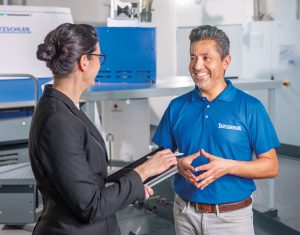![]() MÖNCHENGLADBACH, Germany — April 30, 2024 — With the recent launch of the new IDF 3, Eva Trenz, Trützschler’s product manager, Spinning Preparation, spoke with Senior Expert in R&D Technology, José Guadalupe Flores Molina, about the short preparation process IDF VORTEX SPINNING and its advantages.
MÖNCHENGLADBACH, Germany — April 30, 2024 — With the recent launch of the new IDF 3, Eva Trenz, Trützschler’s product manager, Spinning Preparation, spoke with Senior Expert in R&D Technology, José Guadalupe Flores Molina, about the short preparation process IDF VORTEX SPINNING and its advantages.
Trenz: José, what does IDF VORTEX SPINNING mean?
Molina: Thanks to the IDF, it’s possible to cut down the number of draw frames used in airjet spinning.

For rotor spinning, it is already standard practice to only have cards with IDF directly before the spinning machines. For airjet spinning, however, it is normal to have one card and three draw frames. By using the IDF and a 12-fold creel finisher, customers are able to shorten the preparation process – so they now only need one card with IDF and one finisher before spinning. That means they save space and energy because they need two fewer draw frames.
Trenz: Sounds great, but is it really that simple?
Molina: Yes and no… We started our research project in this area during 2015, conducting a huge number of trials at our R&D center in Germany and on-site at Trützschler customers around the globe. We collected a lot of knowledge, insights and experience. As a result, we knew that the short preparation process for airjet would work reliably when we introduced it at ITMA Asia in 2018 and ITMA 2019. We’ve seen a continuous flow of orders for new airjet spinning projects using the short process since then. And in India, demand for this has boomed.
Trenz: How would you respond to concerns regarding the shorter process?
Molina: The outcome depends on the specific situation. Together with the customer, each application is technologically evaluated in advance. We get the best results with synthetics and yarn counts up to Ne 40 so far, and we have not seen any difference in the quality of the final fabric.
I’ll always remember one customer who switched their production line to the short process using cards with IDF and 12-fold creel finishers. After one year, they hadn’t noticed any change in quality – so they placed a new order for a mill with IDF VORTEX SPINNING.
Trenz: What will the future bring for short spinning processes with IDF?
Molina: We’re always looking for new possibilities to expand the field of application. Our innovators are running tests to achieve finer yarn counts, while also working with different raw materials like Lyocell and blends. That’s what makes this project so much fun for me as an R&D technologist. There are still so many potential applications for airjet spinning where the short preparation process can be used to its full potential. And I believe it will become even more fun with the new IDF 3.
We look forward to seeing the results in the future – and we are proud that IDF VORTEX SPINNING customers can now benefit from the impressive features of our new IDF 3!
“We enjoy working with Trützschler and applying their technology in VORTEX plants,” said Masazumi Shigeyama, VORTEX Product manager. “We’re already operating more than 200 spinning machines with IDF+1 pass. From the first stage of the trial, it was interesting to see that the yarn cut level in IDF+1 pass is less than in the conventional three passage process. This improves spinning machine efficiency a lot. The yarn data shows some small differences between one pass and three passes, but it is difficult to see the difference in knitted fabric. Our target is now to focus on intimate blends. We believe the T-Blend system, IDF and one finisher from Trützschler are a great fit for our sustainable and smart VORTEX factory!”
Posted: May 2, 2024
Source: Trützschler Group SE





